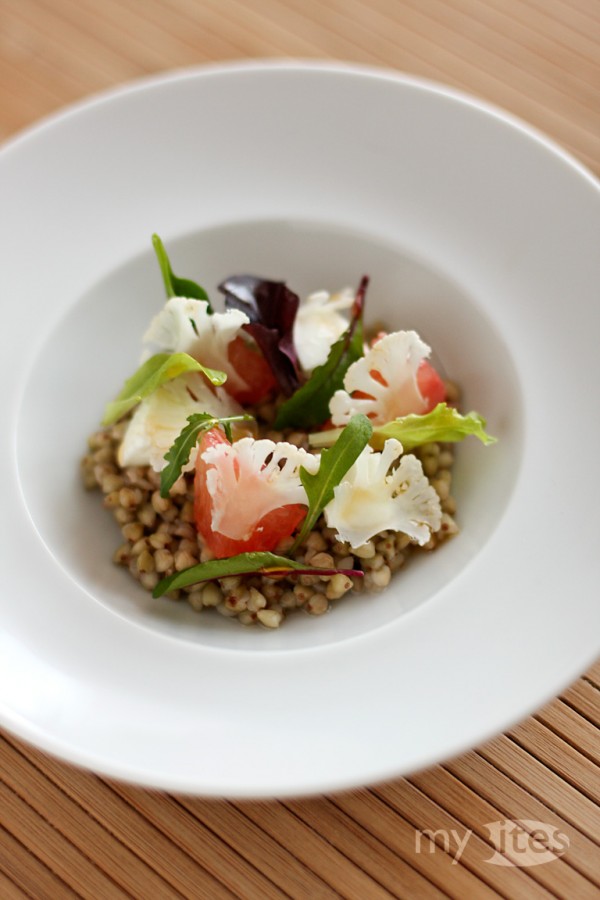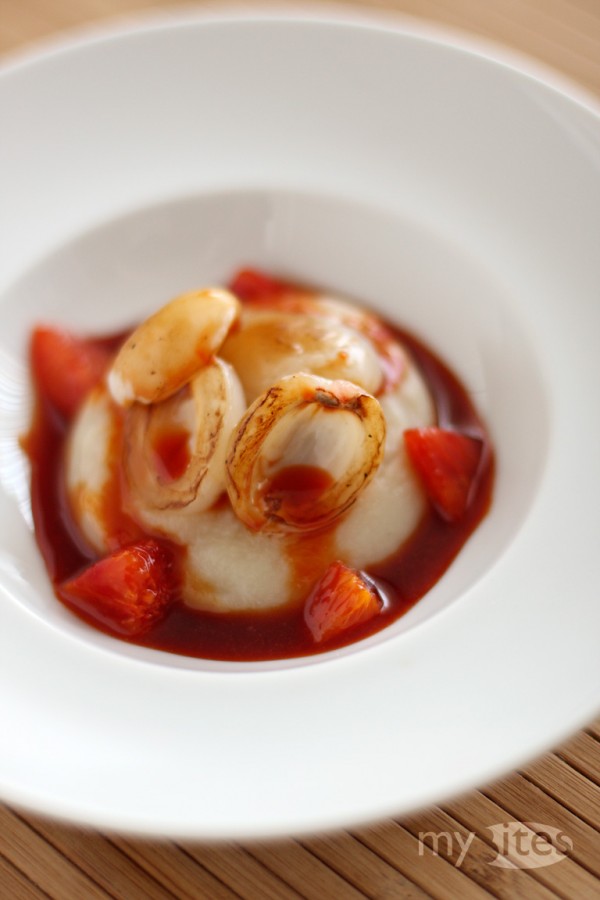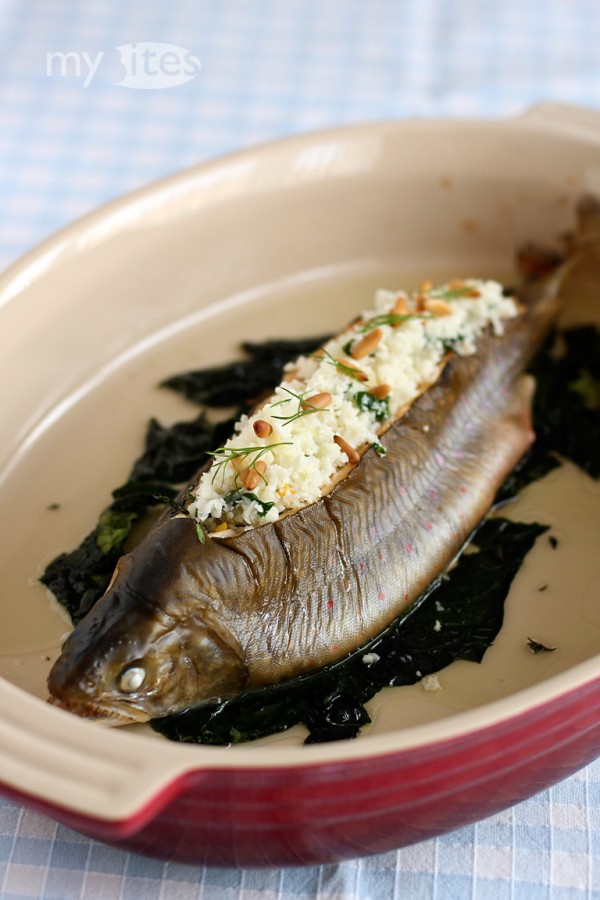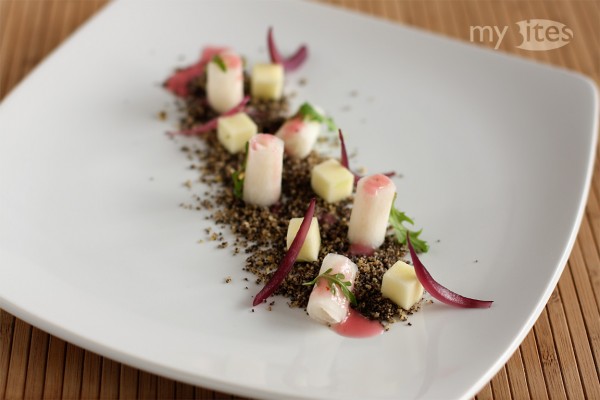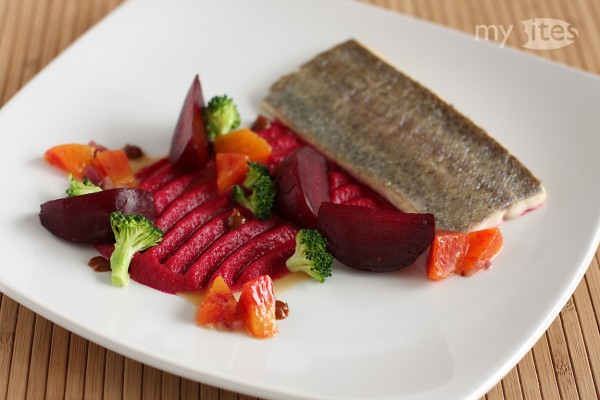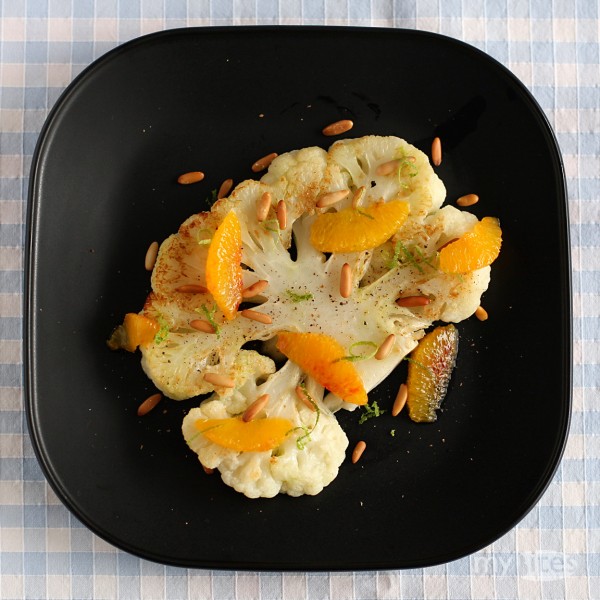Recently, I’ve been using the Foodpairing Explorer even more than usual. I created many interesting combinations, but with most of them I’m still thinking about the optimal ratios, preparations and presentations. The ingredient combination for this fast and simple vegetarian dish is based on a combo list too, which I linked together recently on Foodpairing.
Category Archives: Food Type
Roasted Litchi with Salsify Puree and Blood Orange Sauce
How would you describe the texture of fresh litchis? It’s probably closest to some traditional grape varieties, but this association might come from its very sweet taste as well. Considering the texture only, to my opinion litchis resemble prawns or scallops. Based on this line of thought, I replaced the prawns to litchis in a simple recipe I developed 2 years ago.
Char with Cauliflower Couscous
Have you ever wondered why fish in Germany – and almost everywhere in Europe – is gutted with a cut at its belly? It’s straightforward to some extent, because all innards are located in the belly, and by removing them along with the gills, the fish can be kept refrigerated 3-4 days longer. In China I noticed that fish are usually kept alive in restaurants and killed to order. An even more interesting experience was to see that all fish was cut open and gutted from its back, so the bellies of the fish were always completely intact. I liked this back filleting method simply because the possibilities of stuffing and serving a whole fish. Unfortunately, at the local market in Erlangen they don’t sell any fish alive and all of them are already gutted via a cut along their bellies. So my filleting from the back basically resulted in two fillets held together by the head and the tail of the fish, but made the seasoning of the whole fish a lot simpler and more precise.
Camomile Turnip on Poppy Seed Soil
In my previous post I gave a short review of the renewed Foodpairing website. In a short tutorial I went through all options of the Foodpairing Explorer and simultaneously created a combination of ingredients featuring poppy seeds, banana, turnip, apple and camomile. First this combination might sound a little bit weird, but if you take a closer look, they actually make sense together. Poppy seeds aren’t very sweet but slightly bitter on their own. Banana used as chips are less flavorful and less sweet compared to the raw fresh fruit and it contributes a nice crunchy texture too. Apples can be tart, turnips are actually very sweet and while they are both crisp, their consistencies differ. So to sum up, every main flavor and many different textures are present in the aforementioned combination, which is the foundation of creating an interesting vegan dish based on them.
Trout with Beets, Broccoli and Blood Orange
Two friends of mine, Gabi and Gaba recently launched a new Hungarian food blog with recipes and information about fish and seafood. Because I love to work with local fish like trout or char, they asked me to write a guest post with a recipe featuring trout and seasonal ingredients. Although winter is dark and cold, the ingredients of this season aren’t nearly as grey and dreary as they are often told. This dish is a good example for the bright colors of winter. Actually, the colors of the vegetables are complemented by the single grey element on the plate only, the trout.
Roasted Cauliflower with Orange, Mint and Pine Nuts
It’s very hard to find really bloody oranges. At the market here in Erlangen two different kinds of blood oranges are being sold: one half-blood orange called “Tarocco” and a full-blood orange named “Moro”. In the last years and during this winter as well, they were both pretty pale inside, containing only a few red pigments – if any at all. I usually try to determine the bloodiness of an orange by the color of the skin, but unfortunately a red pigmented skin doesn’t guarantee a deep red interior. Since I don’t know any better method, finding really red blood oranges remains a kind of lottery. The statistics for this current winter season are pretty disillusioning: only 1 of 20 blood oranges was truly deep red inside. I planned to use red blood oranges for this vegan dish too, but unfortunately the oranges I bought had yet again only very few red spots. Irrespectively of their color, they fulfilled their means of use by adding sourness and freshness to the dish.
